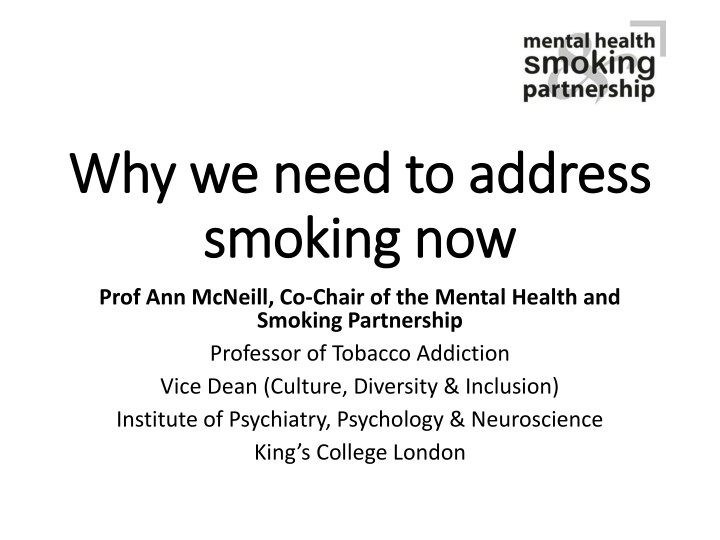
Addressing Smoking: Causes of Inequality, Health Risks, and Impact on Poverty
Smoking is a major cause of inequality, leading to shorter and sicker lives, particularly affecting those with mental health conditions. The financial burden of tobacco exacerbates poverty, with implications on achieving smoke-free goals delayed for those with mental health conditions. Addressing smoking now is crucial to tackle these disparities.
Download Presentation

Please find below an Image/Link to download the presentation.
The content on the website is provided AS IS for your information and personal use only. It may not be sold, licensed, or shared on other websites without obtaining consent from the author. If you encounter any issues during the download, it is possible that the publisher has removed the file from their server.
You are allowed to download the files provided on this website for personal or commercial use, subject to the condition that they are used lawfully. All files are the property of their respective owners.
The content on the website is provided AS IS for your information and personal use only. It may not be sold, licensed, or shared on other websites without obtaining consent from the author.
E N D
Presentation Transcript
Why we need to address Why we need to address smoking now smoking now Prof Ann McNeill, Co-Chair of the Mental Health and Smoking Partnership Professor of Tobacco Addiction Vice Dean (Culture, Diversity & Inclusion) Institute of Psychiatry, Psychology & Neuroscience King s College London
Smoking is a major cause of inequality Smoking is a major cause of inequality Substance use Psychosis 60%2 >80%3 Depression & Anxiety 30- 40%1 General population 14% 66 years Life expectancy gap general population vs mental illness4 81 years 1 RCP (2013) smoking and Mental Health 2. Wu C-Y et al. (2013). PLoS ONE 8(9): e74262. 3. Cookson C, et al (2014) BMC Health Services Research 2014,14:304 , 4. Chang et al PLoS One 2011;6(5)
Shorter, sicker lives Shorter, sicker lives For every person who dies from smoking another 30 are suffering a serious smoking related disease On average, smokers report difficulty completing tasks 7 years earlier, and receive care support 10 years earlier, than never smokers On average, smokers and ex-smokers receive 3.6 times as many hours care as never smokers indicating higher levels of overall need Smokers are less likely to be employed than never smokers, linked to the much greater likelihood of working age disability ASH, The Cost of Smoking to the Social Care System, 2021 https://ash.org.uk/wp- content/uploads/2021/03/SocialCare.pdf ASH, Smoking, Employability and Earnings, 2021 https://ash.org.uk/information-and- resources/reports-submissions/reports/smokingemployability/
Smoking and poverty Smoking and poverty Estimate for annual spending on tobacco by smokers with a MH condition range from 1200 to 2200/year 900K 1.2m adults in the UK with a common mental disorder (CIS-R score >12) are living in poverty and are current smokers If we counted tobacco expenditure in our calculations of poverty many hundreds of thousands more would be in poverty T Langley, Mental health, smoking and poverty in the UK: Tessa Langley, European Journal of Public Health, Volume 26, Issue suppl_1, November 2016, ckw174.180, https://doi.org/10.1093/eurpub/ckw174.180
20 year gap in securing 20 year gap in securing smokefree smokefree goals goals Projected rate of decline among smokers with & without a mental health condition People with MH conditions won t reach smokefree (5% prevalence) until 20 years later than people without at the current rate of decline Richardson & Robson (2021) Adapted from Richardson et al (2019) Smoking and quitting behaviours by mental health conditions in Great Britain (1993-2014) Addictive Behaviours 90:14-10
Journey to the Long Term Plan Journey to the Long Term Plan Persistent high prevalence of smoking reflects a major failure of public health and clinical services to address the needs of a highly disadvantaged sector of society. (RCP & RCPsych, 2013) In 2016, we called for exactly the kind of programme in the NHS Long-Term Plan
Implementation challenge: Training Implementation challenge: Training Proportion of psychiatrists who have never had, or who can't remember having, training in the following areas of smoking cessation support/interventions: 80% 9% 10% 70% 60% 8% 50% 9% 9% 40% 67% 66% 6% 30% 55% 41% 20% 40% 28% 10% 0% Giving very brief advice (or ask, advice and act) Behavioural support for smoking cessation How to refer to smoking cessation services, or relevant smoking cessation lead Use of Nicotine Replacement Therapy Other smoking cessation medications i.e. Varenicline and Bupropion Use of e-cigarettes I have not had training on this topic I don't remember ASH, Smokefree Skills: training needs of mental health nurses and psychiatrists, 2020 https://ash.org.uk/information-and-resources/reports-submissions/reports/smokefreeskills/
Implementation challenge: Myth of Implementation challenge: Myth of low motivation low motivation Believe patients with mental health conditions are not motivated to quit Inpatient mental health professionals 6% 10% 28% 44% 13% Community mental health professionals 8% 7% 22% 48% 15% I don't know Strongly agree Agree Disagree Strongly disagree ASH, Smokefree Skills: training needs of mental health nurses and psychiatrists, 2020 https://ash.org.uk/information-and-resources/reports-submissions/reports/smokefreeskills/
Implementation challenge: variable Implementation challenge: variable smokefree smokefree policies How often staff accompany patients on smoking breaks on average adult mental health wards (all surveyed trusts) policies Never, 14% Less often, 5% At least once a month, 8% At least once a day, 57% At least once a week, 16% ASH, Progress Towards Smokefree Mental Health Settings, 2019 https://ash.org.uk/wp- content/uploads/2019/10/PHE-mental-health-trust-2019-survey-full-report_v12.pdf
Implementation challenge: impact of Implementation challenge: impact of COVID COVID- -19 19 There have been reports that policy implementation has been disrupted in some areas, particularly for smokefree policies Evidence indicates that some smokers with a mental health condition have quit smoking with greater success during the pandemic BUT others are increasing their consumption of tobacco, relapsing, or taking up smoking for the first time. (YouGov COVID tracker; OWLS survey) Consequently, the pandemic may be exacerbating the significant inequalities this group already face The disruption of pandemic means the LTP is behind schedule and risks being deprioritised in the face of current pressures will mental health service users be back of the queue again?
But even if we implement fully the NHS But even if we implement fully the NHS Long Long- -Term Plan, it won t be enough Term Plan, it won t be enough We also need: Similar systems in community mental health services Better primary care support Full engagement of smokers to use alternatives like using e-cigarettes
However, if we can reduce smoking we will However, if we can reduce smoking we will Extend healthy life expectancy and reduce care needs Reduce levels of poverty and promote employment Improve levels of good mental health - quitting smoking has been shown to have = or > effect than anti- depressants six weeks after quitting, effects which last over many years (Taylor et al, 2021) Reduce the level of some anti-psychotic medications (RCP/RCPsych, 2013) Improve the treatment outcomes for drug and alcohol use and reduce use illegal drugs (Reed et al, 2021)






















